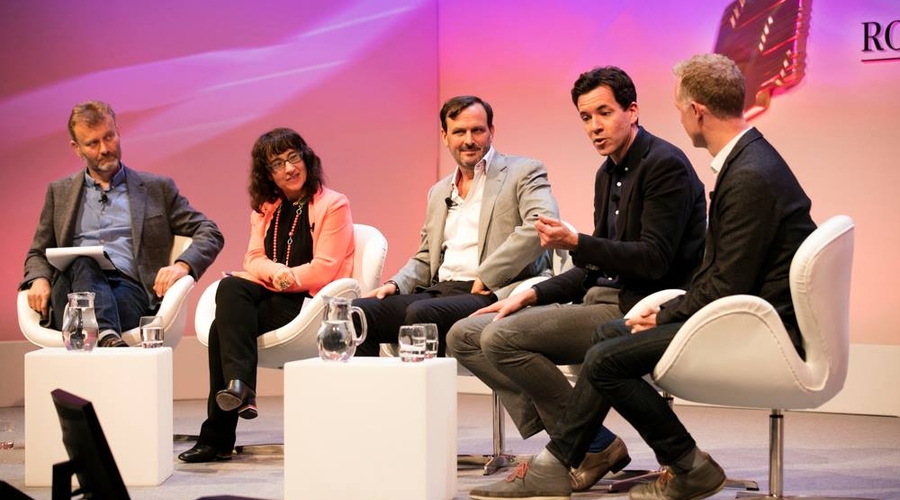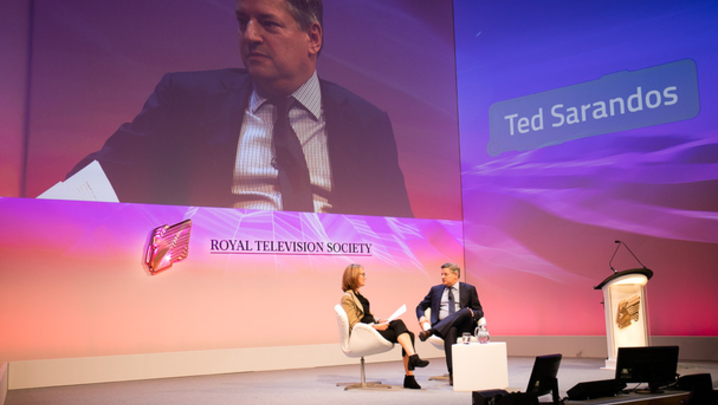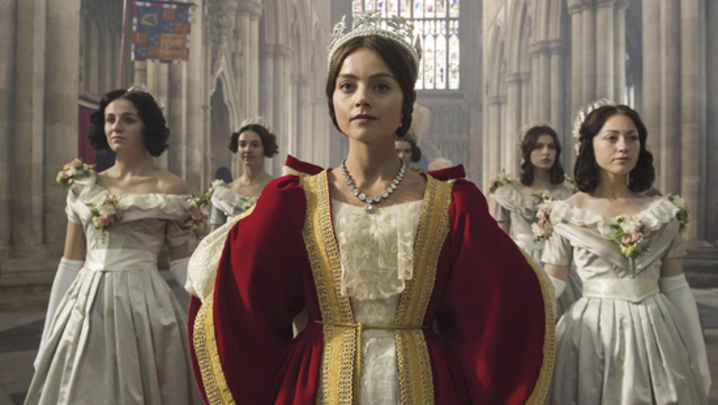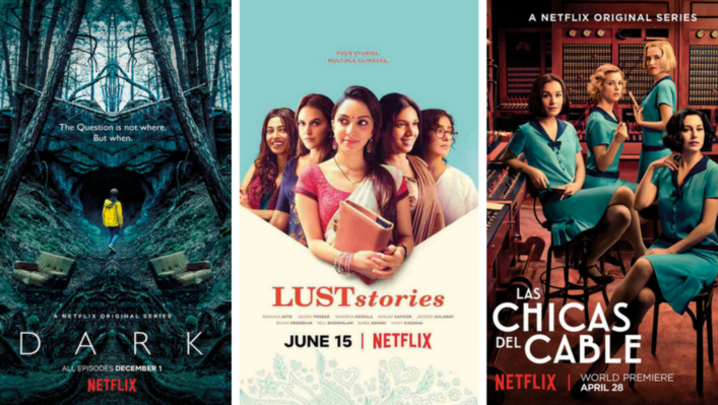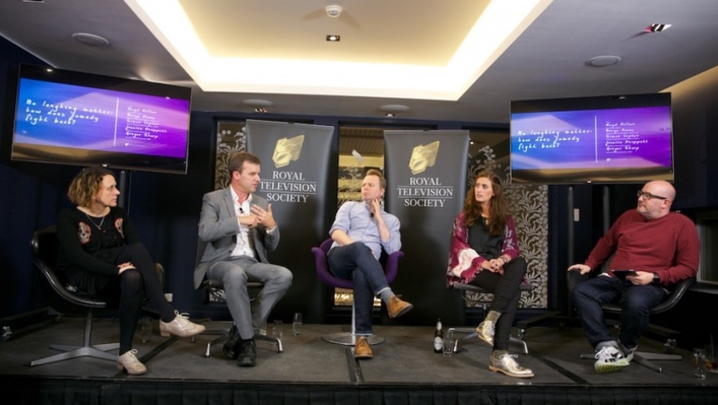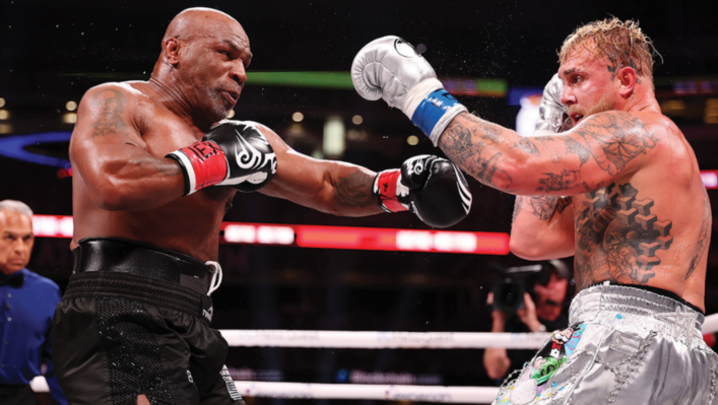Tara Conlan reports on our fourth London Conference session, titled 'You Don’t Own A TV? What Is All Your Furniture Pointed At?'. She hears the panel discuss a connected world where everything is available everywhere, at any time
Comedian Hugh Dennis aired the thoughts of many trying to navigate the new television landscape when he introduced this session. In a video diary shown to conference delegates, he was seen stuck inside a room for a month. His task was to watch all the content available to modern audiences.
“Watching telly used to be so easy,” he complained. “Four channels, maybe five – everyone watched the same thing in the same place at the same time, unless your family was at the cutting edge of technology and had a VCR.”
“Now, you can watch any episode of anything at any time, anywhere, and it is doing my head in. Everything I want to see is being ruined by people who seem to have more free time than I have.
“I don’t want people to look at me pitifully when I say, ‘Making a Murderer, what’s that about?’ So, I’ve locked myself in here.… I’m not coming out until I’ve watched everything.”
His experience of TV overkill involved watching some “Scandi” series, Narcos and Game of Thrones. He then had a “slightly weird day” where he “accidentally watched an advert”. Another day was spent on cat videos on YouTube, but then he found that, “YouTube make TV shows now, too, so I have to watch all its channels. What next? Fifty hours of free TV every time you order a tin of beans?”
The film cut to the following day with Dennis saying to camera: “So, I ordered these beans from Amazon Prime and it turns out that I do get 50 hours of free telly. I’m never going to get out of here.”
The star of Outnumbered and new BBC Three hit Fleabag then opened the debate by asking the panel: “With so many different ways of consuming TV, will the next generation ever be able to concentrate? Are certain demographics being left behind? What does it mean for linear [and] is there too much content?”
The overall impression was that, despite the explosion in new ways of consuming content, traditional television is still extremely popular.
Research by Enders Analysis showed that more than 80% of UK video viewing is of broadcasters’ content.
"We reckon that, if you have 1 million views on YouTube, you make $5,000 – so scale is everything"
ITV’s Managing Director of Online, Pay-TV, Interactive & Technology, Simon Pitts, said: “I know that it’s not a fashionable thing to say but young people still watch lots of mainstream telly… X Factor, Bake Off, Britain’s Got Talent – these get about a 65% share among 16-34s. Coronation Street gets a 35% share of 16- to 34-year-olds.
“But we shouldn’t kid ourselves: young people aren’t going to wake up one morning and instantly turn into their parents. They are watching TV in a very different way and it seems it’s all about multi-device, a bit less live and a bit more involved.”
Dennis, who used to work for Unilever as Lynx brand manager, wondered if TV’s brave new world spelt doom for the traditional commercial break.
“No,” thought Pitts. “It just means that you have to work harder to get content to [audiences] in different ways.”
MediaCom UK Chief Strategy Officer Sue Unerman added: “We are sitting on the brink of the disruptors and the disrupted coming together and creating a new ecosystem – different forms of generating revenue, different ways of reaching consumers, more complicated, but not necessarily less profitable.”
Is cable one of the losers in the new world of television as people “cut the cord”, asked Dennis, turning towards Liberty Global SVP and Chief Strategy Officer Jim Ryan.
Not at all, maintained Ryan, who accepted that some homes were cutting costs, but things were not as simple as “you’re a dinosaur because you’re still connected”.
He pointed out that Virgin was one of the first platforms in the UK to include Netflix and was gaining subscribers: “We’re clearly offering something that people want, which is not just the content but everything around it.”
YouTube has more than 1 billion people a month using its service, said its Director of Partnerships, Ben McOwen Wilson. Mobile accounted for over 60% of the platform’s consumption. YouTube was seeing “partners here in the UK and other markets adapt in how they deliver their content” in the new era. He highlighted the popularity of James Corden’s Carpool Karaoke segment from his US chat show.
Dennis shifted the discussion on to the ongoing battle of big US dramas, which fed the “slight sense that you are missing something all the time”.
Pitts questioned whether the current level of investment in drama was sustainable. Not everyone in the UK watched US drama. They still loved UK drama, too. “Our challenge is making sure that our new drama… gets everywhere – for instance, in box-set form, not just linear.”
Unerman added that, although “it might be unfashionable” to say so, “It’s not all about 16- to 34-year-olds. The economic power in this country, outside of gaming, is primarily women over the age of 40 – who do like a bit of drama.”
“You can’t repeat drama, though,” said Dennis.
No so, Pitts countered: “Tell that to the person who runs ITV3 at our place… You get 1 million viewers a night for drama that’s been out maybe five or 10 years.”
YouTube, said McOwen Wilson, tried “to make sure that the audience can find its content… from any creator on the planet”, from the biggest broadcasters to those doing make-up demonstrations in their bedrooms.
The conversation turned to how many new entrants invested in high-quality content and monetised it.
Ryan pointed out that around three-quarters of so-called disruptors to the market in recent years had vanished – mostly due to the high cost of quality content.
“If there’s a problem, it is that there isn’t yet a very clear business model for making money out of platforms such as YouTube… unless you are YouTube or Facebook,” said Pitts to laughs from the audience.
He added: “It’s not that they’re not fantastic platforms… but it’s not clear how content providers and broadcasters are going to get a bang for their buck on the platform. We reckon that, if you have 1 million views on YouTube, you make $5,000 – so scale is everything.”
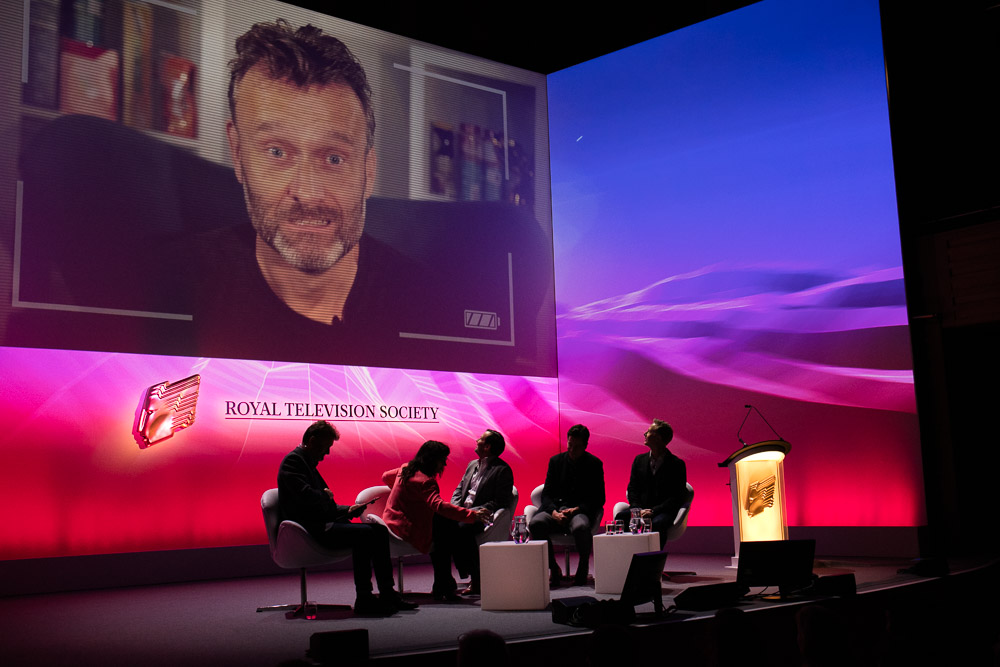
However, McOwen Wilson argued that: “There are people who are creating original content, albeit from a different price point… but who are very definitely building distribution businesses and ad-funded business.
“In Europe, we’ve got tens of thousands of people who are making six-figure sums.”
One of the key things that remained constant was the idea of a schedule, which Pitts thought was still very important: “Ask the people spending lots of money bidding for EPG slots on Sky.” Or look at the impact of BBC Three losing its broadcast slot. “You look at these massive new entertainment companies such as Vice, the poster-child of young media. What’s the big growth strategy for Vice? Launching linear TV channels.”
Although “there’s not an algorithm for a TV hit”, said Pitts, ITV was “looking at platforms such as YouTube, which are exciting, [with] content that looks more and more like TV. And there is a lot that can be learnt from these guys. They are doing things more cheaply, turning round more quickly, they pilot more efficiently.”
The final word went to McOwen Wilson. He did little to allay Dennis’s fears of being left behind when he said: “If the pace of change feels scary now, it’s only going to get faster.”
The panellists were: Ben McOwen Wilson, Director of Partnerships, YouTube; Simon Pitts, Managing Director, Online, Pay-TV, Interactive & Technology, ITV; Jim Ryan, SVP and Chief Strategy Officer, Liberty Global; and Sue Unerman, Chief Strategy Officer, MediaCom UK. The session was chaired by comedian and actor Hugh Dennis and produced by Saurabh Kakkar.

